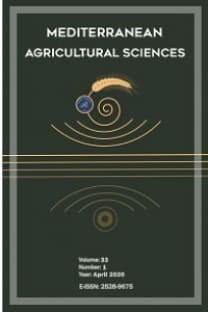Antalya ili bodur elma üretiminde enerji kullanım etkinliğinin belirlenmesi: Elmalı ilçesi örneği
Bu çalışmada Antalya İli Elmalı ilçesinde bodur anaç kullanılarak yapılan elma üretiminde girdi kullanım miktarlarının belirlenmesi ve buna bağlı olarak enerji kullanım etkinliğinin hesaplanması amaçlanmıştır. Çalışmada kullanılan veriler Elmalı ilçesine bağlı toplam 9 köyden 63 elma üreticisinden anket yöntemi ile elde edilmiştir. Değerlendirme sonuçlarına göre, toplam enerji girdisi 47666 MJ ha-1 olarak hesaplanırken, toplam enerji çıktısı 107650 MJ ha-1 olarak belirlenmiştir. Enerji kullanım etkinliği 2,26 olarak hesaplanmıştır. Sonuçlar doğrultusunda enerji girdisi olarak en yüksek payı % 37,71 ile kimyasal gübreler alırken bunu % 30,82 ile kimyasal ilaç tüketimi izlemektedir. Toplam enerji girdisinin %84,83’ünü yenilenemez enerji oluştururken,%13,65’ini yenilenebilir enerji kaynakları oluşturmuştur.
Anahtar Kelimeler:
Elma, Girdi kullanımı, Enerji analizi, Antalya
Determination of the energy efficiency in dwarf apple production in Antalya Province: A case study for Elmali
Main objectives of this study were to define total amount of input usage for dwarf apple production in Elmalı region of Antalya and to determine the energy equivalent of this inputs. The data of this study was collected by questionnaire method which was carried out face to face with 63 mother dwarf apple producer from the 9 villages in Elmalı region. Ratings showed that total energy input of the dwarf apple production was 47666 MJ ha-1 and total energy output was 107650 MJ ha-1. Energy equivalent of this production was 1.94. The results showed that the highest proportion of the energy equivalences belong to chemical fertilizer with %37.71 percent, followed by the chemical medicines with %30.82 percent. Of the total energy inputs, %84.83 is made of non renewable and %13.65 of renewable energy sources.
Keywords:
Apple, Input, Energy analysis, Antalya,
___
- Berardi GM (1978) Organic and conventional wheat production: examination of energy and economics. Agro-Ecosystems 4: 367– 76.
- Dalgaard T, Halberg N, Porter JR (2001) A Model for fossil energy use in danish agriculture used to compare organic and conventional farming. Agriculture, Ecosystems and Environment 87: 51-65.
- De D, Singh RS, Chandra H (2001) Technological impact on energy consumption in rainfed soybean cultivation in Madhya Pradesh. Applied Energy 70: 193–213.
- Demircan V, Yılmaz H, Binici T (2005) Isparta ilinde elma üretim maliyeti ve gelirinin belirlenmesi. Tarım Ekonomisi Dergisi 11: 71- 80.
- Ekinci K, Akbolat D, Demircan V, Ekinci Ç (2005) Isparta ili elma üretiminde enerji kullanım etkinliğinin belirlenmesi. III. Yenilenebilir Enerji Kaynakları Sempozyumu ve Sergisi, Mersin.
- Esengun K, Gunduz O, Erdal G (2007) Input–output energy analysis in dry apricot production of Turkey. Energy Conversion and Management 48: 592-598
- Göktolga Z G, Gözener B, Karkacıer O (2006) Şeftali üretiminde enerji kullanımı, Gaziosmanpaşa Üniversitesi Ziraat Fakültesi Dergisi 23: 39-44.
- Gül M (2006). Technical efficiency of apple farming in Turkey: A case study covering Isparta, Karaman and Nigde provinces. Pakistan Journal of Biological Sciences 9: 601-605.
- Hülsbergen K J, Feil B, Biermann S, Rathke GW, Kalk WD, Diepenbrock W (2001) A method of energy balancing in crop production and its application in a long-term fertilizer trial. Agriculture, Ecosystems and Environment 86: 303-21. Kennedy S (2000) Energy ttp://web.mit.edu/10.391j/www/proceeding.html, January 2000. use in American agriculture. Accessed 5
- DEFRA (2000) Energy use in organic farming systems. UK Ministry of Agriculture, Fisheries and Food, Research and Development Final Project Document=OF0182_181_FRP.pdf. Accessed 12 May 2010.
- Mandal KG, Saha KP, Ghosh PK, Hati KM, Bandyopadhyay KK (2002) Bioenergy and economic analysis of soybean based crop production systems in Central India. Biomass and Bioenergy 23: 337-45.
- Ozkan B, Akcaoz H, Fert C (2004a) Energy input-output analysis in Turkish agriculture. Renewable Energy 29:39-51.
- Ozkan, B, Kuklu A, Akcaoz H (2004b) An input–output energy analysis in greenhouse vegetable poduction: A case study for Antalya region of Turkey. Biomass and Bioenergy 26: 89 – 95.
- Ozkan B, Akcaoz H, Karadeniz F (2004c) Energy requirement and economic analysis of citrus production in Turkey. Energy Conversion and Management 45: 1821-1830.
- Schneeberger KC, Breimyer HF (1974) Agriculture in an Energy- Hungry world. Southern Journal of Agricultural Economics July: 193-97.
- Scrimgeour F (2007) Energy and agriculture in Australia and New Zealand: Politics, prices and economic outcomes. In: 51st AARES Annual Conference, Queenstown.
- Shrestha DS (1998) Energy use efficiency indicator for agriculture. Http://Www.Usaskca/Agriculture/Caedac/PDF/Mcrae.PDF. Accessed 10 October 2002.
- Singh H, Mishra D, Nahar NM (2002) Energy use pattern in production agriculture of a typical village in aerial zone, India-Part I. Energy Conversion and Management 43: 2275–2286.
- Singh JM (2002) On farm energy use pattern in different cropping systems in Haryana, India. Master of Science, Int. Inst. of Management Univ. of Flensburg, Sustainable Energy Systems and Management, Germany.
- Strapatsa AV, Nanos GD, Tsatsarelis CA (2006) Energy flow for integrated apple production in Greece. Agriculture, Ecosystems and Environment 116: 176-80.
- Yaldiz O, Ozturk H H, Zeren Y, Bascetincelik A (1993) Energy usage in production of field crops in Turkey. In: 5th International Congress on Mechanization and Energy Use in Agriculture, Kusadasi, Turkey.
- Yamane T (1967) Elementary Sampling Theory. Prentice Hall Englewood Cliffs, New Jersey.
- Yilmaz I, Akcaoz H, Ozkan B (2005) An analysis of energy use and input costs for cotton production in Turkey. Renewable Energy 30: 145-155.
- Yayın Aralığı: Yılda 3 Sayı
- Başlangıç: 1988
- Yayıncı: Akdeniz Üniversitesi
Sayıdaki Diğer Makaleler
Hukukî açıdan zirai kazançların vergilendirilmesi
M. CAN, Mustafa CAN, S. ÇOBANOĞLU
Türkiye kesme çiçek sektörü için alternatif bir tür: Anemone coronaria
Antalya ili bodur elma üretiminde enerji kullanım etkinliğinin belirlenmesi: Elmalı ilçesi örneği
İ. YILMAZ, A. ÖZALP, F. AYDOĞMUŞ
Antalya-Serik yöresi seralarında kullanılan sulama sularının kalitelerinin belirlenmesi
F. Öktüren ASRİ, E. İ. DEMİRTAŞ, N. ARI, A. E. ARPACIOĞLU, C. F. ÖZKAN
Drenaj tasarım parametrelerinin sayısal denemelerle değerlendirilmesi
D. BÜYÜKTAŞ, R. BAŞTUĞ, K. AYDİNŞAKİR
Süt toplama merkezlerinin, sokak sütçülüğünü önlemedeki rollerinin belirlenmesi: Antalya ili örneği
